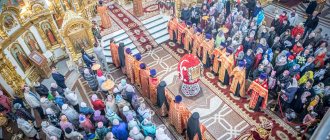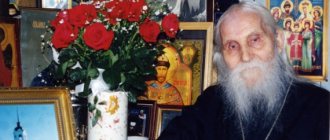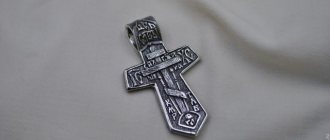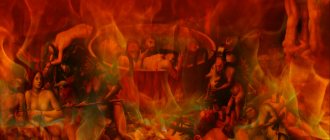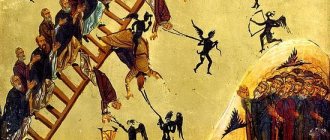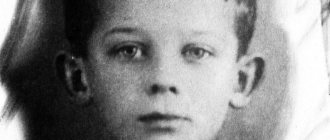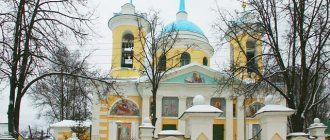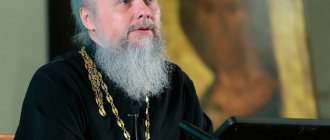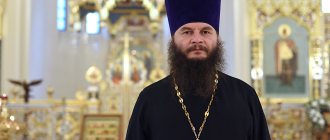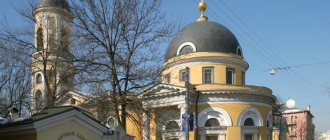short biography
On April 13, 1955, in the village of Usva, a boy Kolya was born into an ordinary Soviet family. His father was an engineer. After graduating from the Tolyatti school, he was drafted into the ranks of the Soviet army.
At the age of 22, in 1977, he was ordained to the rank of deacon, the rite of ordination in the Church of the Intercession of the Virgin Mary in the city of Kuibyshev was performed by Archbishop of Kuibyshev and Syzran John (Snychev).
Archpriest Nikolai Agafonov
After his ordination, Nikolai Agafonov, as a deacon of the Kazan Church in Togliatti, organizes a youth group that meets underground.
The Penza diocese met the young priest in 1979, Archbishop Veraphim (Tikhonov) of Penza and Saransk ordained him to the rank of presbyter and blessed him as rector of the Church of St. Michael in the village of Vadinsk.
Two years, 1982-1984 Father Nikolai is the rector of the Kuznetsk Kazan Church, then he is sent to Volgograd as the rector of the Nikitsky Church, and a year later he is already a priest in the Kazan Cathedral.
After graduating from the Moscow Theological Seminary, while studying at the Theological Academy in St. Petersburg, he was appointed rector of St. Michael’s Church in Lomonosov. In 1991, by decision of the Holy Synod, he headed the leadership of the Theological Seminary in Saratov as rector.
In 1995 he moved as rector of the Temple of the Kazan Holy Image of the Mother of God to the village. Called to the Saratov region, and a year later returned to Volgograd as rector of the Church of the Great Martyr Paraskeva, while simultaneously heading the missionary department.
Interesting! As the head of the missionary department of the Volgograd diocese, he participated in the construction of two floating missionary churches. For this amazing creation, the Holy Church awarded him an award - the Order of St. Innocent, 3rd degree.
2001 marked the beginning of the priest’s literary activity; a year later the magazine “Father’s Land” published the stories of Father Nikolai.
In 2005 he became a laureate of the All-Russian Prize in the field of literature “Crystal Rose of Viktor Rozov”, and in 2007 he received the Prize of the Holy Blessed Prince Alexander Nevsky.
In addition to the awards listed above, he was awarded;
- in 1993, a Cross with decorations for the revival of the Theological Seminary in Saratov;
- Mitra in 2005.
2007-2009 - Father Agafonov - teacher of the course “Fundamentals of Theology” at the Theological Seminary of Sretensk.
As a member of the Russian Writers' Union, he was awarded the Patriarchal Prize in 2014.
Patriarchal Literary Prize 2014
The word “oncology” made its own adjustments to the life of the priest, who served the Creator until his last breath, not forgetting the Lord’s instructions to “Rejoice!” He died quietly, at the end of the unction, with his eyes fixed on the sky. This happened on June 17, 2022.
The Lord granted Archpriest Nikolai Agafonov a peaceful death in the arms of his wife and children. On June 19, 2022, thousands of parishioners in Samara saw off their beloved mentor and counselor on his last journey.
Killed while on duty
(Non-crime story)
“Greater love has no one than this, that a man lay down his life for his friends.” (Gospel of John, 15; 13)
“And when he’s finished with everyone, then he’ll say to us: “Come out,” he’ll say, “you too!” Come out drunk, come out weak, come out drunk!” And we will all go out without shame and stand. And he will say: “You pigs! The image of the beast and its seal; but come too!” And the wise will say, the wise will say: “Lord! Why do you accept these people?” And he will say: “That is why I accept them, the wise ones, because I accept them, the wise ones, because not one of these himself considered himself worthy of this...” (F.M. Dostoevsky. “Crime and Punishment”)
It was already ten o'clock in the evening when a sharp bell rang in the diocesan administration. And Stepan Semyonovich, the night watchman, who had just laid down to rest, grumbled dissatisfiedly: “Who is this difficult woman carrying?”, shuffling with worn-out house slippers, trudged to the door. Without even asking who was calling, he shouted irritably, stopping in front of the door:
- There is no one here, come tomorrow morning.
But behind the door a dispassionate voice answered:
— Urgent telegram, please accept and sign.
Having received the telegram, the watchman brought it to his closet, turned on the table lamp and, putting on his glasses, began to read. “On July 27, 1979, Archpriest Fyodor Mirolyubov tragically died in the line of duty, we are awaiting further instructions. Church Council of St. Nicholas Church of the village of Buzikhino.”
“The Kingdom of Heaven to God’s servant Father Fyodor,” said Stepan Semyonovich sympathetically and re-read the telegram out loud again. The wording was confusing: “He died in the line of duty...” This didn’t fit at all with the priestly rank.
“Well, there’s a policeman or a fireman, or at least a watchman, of course, God forbid, that’s understandable, but Father Fyodor?” - Stepan Semenovich shrugged his shoulders in bewilderment.
He knew Father Fyodor well when he still served in the cathedral. Father differed from other clergy of the cathedral in his simplicity of communication and responsive heart, for which he was loved by the parishioners. Ten years ago, Fyodor’s father experienced great grief in his family - his only son Sergei was killed. This incident happened when Sergei was going home to please his parents with passing the exam for medical school, although Father Fedor dreamed that his son would study at the seminary.
“But since I chose the path not of a spiritual, but of a physical doctor, all the same - God grant him happiness... He will treat me in my old age,” Father Fyodor said to Stepan Semenovich when they were sitting over tea in the cathedral gatehouse. It was then that this terrible news caught them.
On the way from the institute, Sergei saw four guys beating a fifth guy right next to the bus stop. The women at the bus stop tried to reason with the hooligans by shouting, but they, not paying attention, kicked the already lying man. The men standing at the bus stop turned away in shame. Sergei, without hesitation, rushed to the rescue. It was only a month later that the investigation found out who stabbed him with a knife. What good would it do, no one could return his son to Father Fyodor. For forty days after the death of his son, Father Fedor served funeral masses and memorial services every day. And as forty days passed, they often began to notice Father Fyodor drunk. It happened that he came to the service drunk. But they tried not to reproach him, understanding his condition, they sympathized with him. However, this soon became increasingly difficult to do. The bishop several times transferred Father Fyodor to the position of psalm-reader to correct him from drinking wine. But one incident forced Vladyka to take extreme measures and dismiss Father Fedor as a staff member.
Once, having received a month’s salary, Father Fyodor went into a glass shop, which was located not far from the cathedral. The regulars of this establishment treated the priest with respect, for out of his kindness he treated them at his own expense. This time it was the anniversary of his son’s death, and Father Fyodor, throwing his entire salary on the counter, ordered everyone who wanted to be treated to food throughout the evening. The storm of delight that arose in the tavern resulted in a solemn procession at the end of the drinking session. A stretcher was brought from a nearby construction site, Father Fyodor was hoisted onto it and, declaring him the Great Pope of the Rumochnaya, they carried him home across the entire block. After this incident, Father Fedor ended up in exile. He was without ministry for two years before he was appointed to the Buzikha parish.
Stepan Semyonovich re-read the telegram for the third time and, sighing, began to dial the Vladyka’s home telephone number. Vladyka Slava's cell attendant answered the phone.
“His Eminence is busy, read the telegram to me, I’ll write it down and then pass it on.”
The contents of the telegram puzzled Slava no less than the watchman. He began to think: “To die tragically in our time is a couple of trifles, which happens quite often. For example, last year a protodeacon and his wife died in a car accident. But what do job responsibilities have to do with it? What might happen during a worship service? Probably these Buzikha people got something mixed up.”
Slava was from those places and knew the village of Buzikhino well. It was famous for the obstinate character of the villagers. The bishop also had to deal with the unbridled temper of the Buzikha people. The Buzikha parish gave him more trouble than all the other parishes in the diocese combined. No matter what priest the bishop appointed to them, he did not stay there long. It lasts a year, or at most another, and complaints, letters, and threats begin. No one could please the Buzikha people. At one time, three abbots had to be replaced in one year. The bishop got angry and didn’t appoint anyone to them for two months. For these two months, the Buzikhinites, like non-popovites, themselves read and sang in church. Only this was of little consolation; you couldn’t serve mass without a priest, so they began asking for a priest. The bishop tells them:
“I don’t have a priest for you, no one wants to come to your parish anymore...
But they don’t back down, they ask, they plead:
- At least someone, at least for a while, otherwise Easter is approaching! What is it like on such a great holiday without a priest? Sin.
The bishop had mercy on them, summoned Archpriest Fyodor Mirolyubov, who was on staff at that time, and said to him: “I am giving you, Father Fyodor, the last chance for correction, I am appointing you as rector in Buzikhino, if you stay there for three years, I will forgive everything.”
Father Fyodor bowed at the bishop's feet with joy and, swearing that he had not taken a single gram in his mouth for a month, he went contentedly to his destination.
A month passes, then another, a year. No one sends complaints to the bishop. This pleases His Eminence, but at the same time worries him: it is strange that there are no complaints. He sends Dean Father Leonid Zvyakin to find out how things are going. Father Leonid went and reports:
“Everything is fine, the parishioners are happy, the church council is happy, Father Fyodor is also happy.”
The bishop marveled at such a miracle, and with him all the diocesan workers, but they began to wait: it could not be that it would last a second year. But another year passed, the third began. The bishop could not stand it, calls Father Fyodor and asks:
“Tell me, Father Fyodor, how did you manage to find a common language with the Buzikha people?”
“But it wasn’t difficult,” answers Father Fyodor. “As soon as I came to them, I immediately recognized their main weakness and played on it.
- How is that? — the bishop was surprised.
“And I realized, Vladyka, that the Buzikha people are an extremely proud people, they don’t like being taught, so I told them at the first sermon: so and so, brothers and sisters, do you know for what purpose the bishop brought me to you?” appointed?
They immediately became wary: “For what purpose?” - “And with such a goal, my beloved, that you guide me on the true path.” Here their mouths were completely open in surprise, and I continued to wallow: “I didn’t finish any seminaries, but from childhood I sang and read in the choir, and therefore I became a priest as if semi-literate. And, due to lack of education, he began to drink excessively, for which he was dismissed from regular service.” Here they nodded their heads sympathetically. “And, left,” I say, “without means of food, I eked out a miserable existence outside the state. To top it all off, my wife left me, not wanting to share my fate with me.”
As I said this, tears welled up in my eyes. I look, and the parishioners’ eyes are wet. “I would have been lost,” I continue, “but our Vladyka, God bless him, with his bright mind realized that for my own salvation it is necessary to appoint me to your parish, and says to me: “No one, Father Fedor, you in the entire diocese he cannot help, except for the Buzikha people, for in this village live a wise, kind and pious people. They will guide you on the right path." Therefore, I ask and pray you, dear brothers and sisters, do not leave me with your wise advice, support me, and point out where I am wrong. For from now on I entrust my destiny into your hands.” Since then we have lived in peace and harmony.
This story, however, made a depressing impression on the bishop.
- What is it, Father Fedor? How dare you attribute to me words that I did not utter? I sent you as a shepherd, and you came to the parish as a lost sheep. It turns out that you don’t shepherd the flock, but she shepherds you?
“But for me,” Father Fyodor answers, “it doesn’t matter who shepherds whom, as long as there is peace and everyone is happy.”
This answer completely infuriated the bishop, and he sent Father Fyodor out of office.
The Buzikha people did not accept the newly sent priest at all and threatened that if Father Fyodor was not returned to them, they would go all the way to the Patriarch himself, but would not give up on their own. The most zealous ones suggested luring the bishop to the parish and turning his car upside down, and not turning it back until Father Fyodor was returned. But the bishop himself had already cooled down and decided not to start a scandal. And he returned Fyodor’s father to the Buzikha people.
Five years have passed since then. And now Slava held the telegram, wondering what could have happened in Buzikhino.
And this is what happened in Buzikhino. Father Fyodor always woke up early and never stayed in bed; After washing, I read the rule. This is how his every day began. But this morning, opening his eyes, he lay in bed for almost half an hour with a blissful smile: at night he saw his late mother. Father Fedor rarely saw dreams. And here it’s so unusual, so light and bright.
Father Fyodor himself in the dream was just a boy Fedya, galloping on a horse through their native village, and his mother came out of the house to meet him and shouted: “Fedya, give the horse a rest, tomorrow you and your father will go to the fair.” At these words, Father Fyodor woke up, but his heart continued to beat joyfully, and he smiled dreamily, remembering his childhood. He considered seeing his mother in a dream a good sign, which means that her soul is calm, because in church prayers for her repose are constantly offered up for her.
Glancing at the wall clock, he got out of bed, groaning, and wandered to the washbasin. After prayer, as usual, he went to drink tea in the kitchen, and after drinking, he settled down to read the newspapers that had just been brought. The door opened slightly and the curly head of Petka, the grandson of the church bell ringer Paramon, appeared.
- Father Fyodor, I brought you some fresh crucian carp, I just caught it.
“Come on in, show me your catch,” Father Fyodor said good-naturedly.
Petya’s arrival was always a joyful event for Fyodor’s father; he loved this little boy, who somehow reminded him of his own deceased son. “Oh, if he had passed by, he would not have orphaned his father, now I would probably have grandchildren. But that means it’s God’s will,” Father Fyodor thought painfully.
He didn’t leave Petka without a gift, either he would fill his pockets full of sweets or gingerbread. But, of course, he understood that Petya did not come to him for this, and he was extremely curious, asking Father Fyodor about everything, and sometimes asking such tricky questions that you couldn’t answer right away.
“Little crucian carp,” Petya justified himself, embarrassedly holding out a plastic bag with a dozen small, palm-sized crucian carp.
“Every gift is good,” Father Fyodor boomed, putting the crucian carp in the refrigerator. “And the most important thing is that he brought a gift from the labor of his hands.” And I saved this for you,” and with these words he handed Petka a large chocolate bar.
Thanking him, Petya turned the chocolate over in his hand and tried to put it in his pocket, but the chocolate wouldn’t fit, and then he quickly put it in his bosom.
- Eh, brother, it won’t work like that, your belly is hot, the chocolate will melt - and you won’t be able to bring it home, it’s better to wrap it in a newspaper. Now, if you’re not in a hurry, sit down and let’s have some tea.
- Thank you, father, my mother milked the cow, so I’ve already drunk some milk.
- Sit down anyway, tell me something.
— Father Fyodor, my grandfather tells me that when I grow up, I will receive a recommendation from you and enter the seminary, and then I will become a priest, like you.
- Yes, you will be even better than me. I’m illiterate, I didn’t study in seminaries, those were the wrong years, and there were no seminaries then.
— You say “illiterate,” but how do you know everything?
— I read the Bible, there are some other books. I know a little.
“And dad says that there is nothing to do in the seminary, since the Church will soon die out, and it is better to go to the agricultural institute and become an agronomist, like him.”
“Well, your dad said,” Father Fyodor grinned. “I will die, your father will die, you will die someday, and the Church will stand forever, until the end of time.”
“I think so too,” agreed Petya. “Our church has been standing for so many years, and nothing is happening to it, and the club seems to have been recently built, and there’s already a crack running down the wall.” Grandfather says that they used to build firmly and mix the mortar with eggs.
- It’s not about the eggs here, brother. When I said that the Church will stand forever, I did not mean our temple, this is the work of human hands, and it may collapse. And in my lifetime, how many churches and monasteries have been blown up and destroyed, but the Church lives on. The Church is all of us who believe in Christ, and He is the head of our Church. So, even though your father is considered literate in the village, his speeches are unwise.
- How to become wise? How much do you need to study, more than your father, or what? - Petya was puzzled.
- How can I tell you... I met people who were completely illiterate, but wise. “The beginning of wisdom is the fear of the Lord,” as it is said in the Holy Scriptures.
Petya narrowed his eyes slyly:
— Last time you said that you need to love God. How can you both love and fear it at the same time?
- Do you love your mother?
- Certainly.
-Are you afraid of her?
- No, she doesn’t hit me like her father.
“Are you afraid to do something that would make your mother very upset?”
“I’m afraid,” Petya laughed.
- Well then, then, I must understand what kind of “fear of the Lord” this is.
Their conversation was interrupted by a knock on the door. The mother-in-law of the collective farm party organizer, Ksenia Stepanovna, entered. She crossed herself into the icon and approached Father Fyodor for a blessing.
“I’m having a conversation, father, alone with you,” and cast a sidelong glance at Petka.
He, realizing that his presence was undesirable, said goodbye and dashed through the door.
“So, father,” Semyonovna began in a conspiratorial voice, “you know that my Klavka gave birth to a little boy, who has been unbaptized for two months.” My heart ached all over: even the unmarried people themselves, one might say, live in fornication, so at least baptize your granddaughter, otherwise God forbid it gets into trouble.
- Well, why don’t you baptize? - asked Father Fyodor, understanding perfectly why they did not carry the party organizer’s son to church.
- What are you, father, God be with you, is this really possible? What a position he has! Yes, he himself doesn’t mind. Just now he said to me: “Baptize your son, mother, so that no one can see.”
- Well, it’s a good thing, since it’s necessary, we’ll baptize in a secret way. When was the christening scheduled?
“Come on, father, come to us now, everything is ready.” The son-in-law left for work, and his brother, who came from the city, will be godfather. Otherwise, he will leave - how can he go without his godfather?
“Yes,” Father Fyodor drawled meaningfully, “there are no christenings without godfathers.”
- And there is a godfather, my niece, Froska’s daughter. Well, I’ll go, father, I’ll get everything ready, and you follow through the backyards, through the vegetable gardens.
- Don’t teach me, I know...
Semyonovna left, and Father Fyodor began to leisurely get ready. First of all, I checked the baptismal supplies, looked at the light of the bottle with Holy Myrrh, it was already almost at the bottom. “That’s enough for now, and I’ll add more tomorrow.” I put it all in a small suitcase, put the Gospel, and vestments on top of everything. He put on his old duckweed and, coming out, headed through the potato gardens along the path to the party organizer’s house.
In the spacious, bright room there was already a basin of water, and three candles attached to it. The brother of the party organizer came in.
“Vasily,” he introduced himself, extending his hand to Father Fyodor. Father Fyodor, shaking hands, introduced himself:
— Archpriest Fyodor Mirolyubov, rector of St. Nicholas Church in the village of Buzikhino.
Vasily was embarrassed by such a long title and, blinking in confusion, asked:
- How do you call them by your patronymic?
“You don’t need to use your patronymic name, just call him Father Fedor or Father,” Father Fedor answered, pleased with the effect produced.
- Father Fyodor-father, you tell me what to do. I have never participated in this ritual.
“Not a ritual, but a sacrament,” Father Fyodor impressively corrected the completely confused Vasily. - And you don’t have to do anything, stand here and hold your godson.
The godfather, fourteen-year-old Anyutka, came into the room with a baby in her arms. The party organizer's wife looked into the room with restless curiosity.
“But mom is not supposed to be here at the christening,” Father Fyodor said sternly.
“Go, go, daughter,” Semyonovna waved her hands at her. - Then we’ll call you.
Father Fyodor slowly performed baptism, then called the boy’s mother and, after a short sermon about the benefits of raising children in the Christian faith, blessed the mother, reading a prayer over her.
“And now, father, we ask you to come to the table, we must celebrate the christening and drink to the health of my grandson,” Semyonovna began to fuss.
In a kitchen as spacious as an upper room, a table was laid on which there were countless pickles: pickled cucumbers, tomatoes, pickled white cabbage, salted milk mushrooms with sour cream and fatty herring, cut into large slices, sprinkled with onion rings and drizzled with butter. In the middle of the table was a liter bottle of liquid, clear as glass. Nearby, boiled potatoes sprinkled with green onions were steaming in a large bowl. There was something to make my eyes run wild. Father Fedor looked at the bottle with respect.
Semyonovna, catching Father Fyodor’s gaze, hastily explained:
- Pure first-class, she kicked it out herself, transparent, like a tear. Well, Vasya, invite the priest to the table.
“Well, father, sit down, according to Russian custom, we’ll fuck a little for the godson,” said Vasily, contentedly rubbing his hands.
“According to Russian custom, you must first pray and bless the meal, and only then sit down,” Father Fyodor said edifyingly and, turning to the front corner, wanted to make the sign of the cross, but the hand raised to his forehead froze, since only a portrait hung in the corner Lenin.
Semyonovna started wailing, rushed behind the stove, took out the icon, and, taking down the portrait, hung it on a loose nail.
- Forgive us, father, they are young, all party members.
Father Fyodor read the “Our Father” and blessed the table with a wide cross:
- Christ God, bless the food and drink of Your servant, for You are Holy always, now and ever and unto ages of ages, Amen.
He somehow singled out the word “drinking”, placing emphasis on it. Then they sat down, and Vasily immediately poured moonshine into glasses. The first toast was proclaimed to the newly baptized baby. Father Fyodor, having drunk, smoothed his mustache, prophesied:
“The pervach is good, strong,” and began to snack on sauerkraut.
“Can you really compare it to vodka, it’s such disgusting stuff, they use chemistry, but here they have their own purity,” assented Vasily. “Only here, when you come home from the city, can you properly rest and relax.” No wonder Vysotsky sings: “If vodka is not distilled from sawdust, then what would we need from three, four, five bottles?!” - and laughed. “And as I rightly noted, after vodka I have a headache, but after the first drink, even if you take henna, you’ll get over your hangover in the morning and you can drink all day again.”
Father Fyodor silently paid tribute to the snacks, only occasionally nodding his head in agreement.
We drank a second drink to the parents of the baptized baby. Both of their eyes sparkled, and while Father Fyodor, having thickly smeared the jellied meat with mustard, was eating the second glass, Vasily, having stopped eating, lit a cigarette and continued ranting:
“Before, people were at least afraid of God, but now,” he waved his hand in annoyance, “now they’re not afraid of anyone, everyone does what they want.”
- How do you know how it used to be? - Father Fyodor grinned, looking at his drunken godfather.
“That’s what old people say, they won’t lie.” No, we abolished religion early, it still came in handy. After all, what do they teach in church: don’t kill, don’t steal…” Vasily began to bend his fingers. But with these two commandments his stock of knowledge about religion ended, and he, grabbing his third finger, began painfully remembering something else, repeating again:
- Don't kill, don't steal...
“Honor your father and mother,” Father Fedor came to his rescue.
- Well, that’s what I wanted to say, honor. Do they really honor it? Here is my dunce, he went to the eighth grade, and there... You see, his father is not his father, his mother is not his mother. Everyone is hanging around the entrances with all sorts of punks, you can’t get them home, you’ve completely neglected the school,” and Vasily, helplessly slapping his hands on his knees, began pouring them into glasses. “Well, all of them, father,” and, clutching his mouth with his hand, he said in fear: “I almost swore in front of you, but I know: this is a sin... in front of the priest... Semyonovna warned me.” Forgive me, Father Fyodor, we are simple people, in our work things don’t go well without swearing, but with swearing - everything is so clear. Is it a sin, father, to swear at work? So answer me.
“Naturally, it’s a sin,” said Father Fyodor, eating a shot glass with his small spoon.
- But business doesn’t work without him! How to judge if things don't work out? “Hiccupping loudly, Vasily threw up his hands in bewilderment. “And when you swear well,” he slashed the air with his hand, “it’s so bad - and that’s all, these are the pies.” And you say: “Sin.”
- What should I say, that this is a godly deed, swearing? - Father Fyodor was perplexed.
- Uh, but you won’t understand me, I just want to swear, then you would understand.
“Well, curse if you want,” Father Fyodor agreed.
“You’re pushing me to commit a crime so that I can curse in front of the Holy Father... No way!”
Father Fyodor saw that his dinner companion had become rather stubborn, drinking without a snack, and began to get ready to go home. Vasily, completely exhausted, dropped his head on the table, muttering:
“You won’t expect me to swear, but don’t f... you won’t expect me to, I’m all in...
At this time Semyonovna came in:
- Ugh, he got drunk like a beast, he doesn’t even know how to drink properly. Forgive us, father.
- Come on, Semyonovna, it’s not worth it.
- Now, father, Anyutka will see you out. I gave you some fresh eggs, milk, sour cream and something else. Anyutka will demolish it.
Father Fedor blessed Semyonovna and went home. He was in a great mood, his head was a little noisy from the drink, but with such a good snack, this was nothing for him.
A lame Maria was sitting on a bench in front of his house.
“Oh, father, thank God, thank God, I waited,” Maria hobbled under the blessing of Father Fyodor. “But no one knows where you went, I thought you went to the area, that would have been a disaster.”
- For what reason, my dear? - Father Fyodor asked, blessing.
- Oh, father, oh, dear, Dunka Krivosheina is in grief, some kind of grief. Her son Pasha, you know him, last summer he brought firewood to the church on a tractor. Well, the day before yesterday Agrippina, who lives along the road, was plowing her garden. Then, of course, she paid them, as expected, with moonshine. So they, the devils, drank the whole bottle and drove off. The Kirovets that Pashka was working on turned over, you know how high the roadsides are. Last year, remember, Semyon turned over, but he remained alive. And our dear Pasha fell out of the window and was crushed by a tractor. Oh, woe, woe to Eva Dunka’s mother, she was left completely without a breadwinner, she buried her husband, now she has a son. Well, our dear father, we ask by Christ God, let’s go, serve a memorial service over the coffin, and tomorrow they will take us to church for the funeral service. My grandson will take you now.
“Okay, let’s go, let’s go,” Father Fyodor fussed. “I’ll just take the incense and censer.”
- Take, father, take, dear, everything you need, and I’ll wait here, behind the gate.
Father Fyodor quickly got ready and left ten minutes later. Maria’s grandson was waiting for him at the gate on a Ural motorcycle. Maria sat behind him, leaving space in the stroller for Father Fyodor. Father Fyodor picked up his cassock and plopped down in the stroller:
- Well, with God, let's go.
The engine roared and carried Father Fyodor towards his fateful hour. People were crowding around Evdokia Krivosheina’s house. The house is small, low, Father Fyodor, passing through the door, did not bend down in time and hit the upper door frame hard; wincing in pain, he muttered:
- What kind of people do they make such low doors, I just can’t get used to it.
Men were crowding in the depths of the hallway.
“Father Fyodor, come to us,” they called.
Approaching, Father Fyodor saw a small table, laden with glasses and a simple snack.
“Father, let’s remember Pashkin’s soul, so that he may rest in peace.”
Father Fyodor gave Maria a censer with coal and told her to go light it. He took a glass of cloudy liquid with his left hand and crossed himself widely with his right:
“The Kingdom of Heaven to the servant of God Paul,” and in one breath he drained the contents of the glass. “Not the same as the party organizer had,” he thought. Father Fyodor refused the second pile, immediately offered to him, and went into the house.
The upper room was crowded with people. There was a coffin in the middle of the room. For some reason, the face of the deceased, still a young guy, became black, almost like a black man’s. But he looked significant: a dark suit, a white shirt, a black tie, as if he was not a tractor driver, but some kind of state farm director. True, the hands folded on the chest were the hands of a worker; the fuel oil was so ingrained in them that there was no longer any way to wash them off.
Pavel’s mother was sitting on a stool right next to the coffin. She looked tenderly and sorrowfully at her son and whispered something to herself. In the stuffy upper room, Father Fyodor felt the hops taking over him more and more. In the corner, near the door and in the front corner, behind the coffin, there were paper wreaths. Father Fyodor began the funeral service, and the grandmothers sang along with him in thin voices. Somehow awkwardly swinging the censer, he touched the edge of the coffin with it. A coal that flew out of the censer rolled under a pile of wreaths, but no one noticed it.
Only Father Fedor began the funeral litany when terrible screams were heard:
- We're burning, we're burning!
He turned around and saw how brightly the paper wreaths were blazing. The flames spread to others. Everyone rushed through the narrow doors, where a crush immediately formed. Father Fyodor took off his vestments and began to restore order, pushing people through the doors. “That seems to be it,” flashed through his head. “We have to run out, otherwise it will be too late.” He took a last look at the dead man lying calmly in the coffin, and then he saw the hunched figure of Pavel’s mother, Evdokia, behind the coffin. He rushed to her, picked her up, wanted to carry her to the door, but it was too late, the whole door was engulfed in flames. Father Fyodor ran to the window and kicked the frame, then, dragging Evdokia, who was no longer thinking anything from horror, literally pushed her out of the window.
Then he tried it himself, but realized that his heavy body would not fit through such a small window. It became unbearably hot, my head was spinning; Falling to the floor, Father Fyodor glanced at the corner with the images - the Savior was on fire. I wanted to cross myself, but my hand did not obey, did not raise the sign of the cross. Before completely losing consciousness, he whispered: “In Your hands, Lord Jesus Christ, I commend my spirit, be merciful to me, a sinner.”
The icon of the Savior began to warp from the fire, but the compassionate gaze of Christ continued to look kindly at Father Fyodor. Father Fyodor saw that the Savior was suffering with him.
“Lord,” Father Fyodor whispered, “how good it is to always be with You.”
Everything darkened, and from this fading darkness a light of extraordinary softness began to flare up; everything that was before seemed to step aside and disappeared. Next to him, Father Fyodor heard a gentle voice that was very close to him:
“Truly I tell you, today you will be with Me in Paradise.”
Two days later, the dean, Father Leonid Zvyakin, arrived and, calling two priests from neighboring parishes, led the funeral service for Father Fedor. During the funeral service, the church was filled to capacity with people, so much so that some had to stand in the street. They carried the coffin around the church and carried it to the cemetery. Behind the coffin, next to the bell ringer Paramon, was his grandson Petya. His look was full of bewilderment; he couldn’t believe that Father Fyodor was no more, that he was burying him.
In Buzikhino, all agricultural work was suspended on the day of the funeral. Stepping aside a little, the chairman and party organizer of the collective farm walked with their fellow villagers. The mournful faces of the Buzikha residents expressed lonely confusion. They buried a shepherd, who over the years had become a dear and close friend to all his fellow villagers. They came to him with all their troubles and needs, the doors of Father Fyodor’s house were always open for them. Who will they come to now? Who will console them and give them good advice?
“We didn’t save our breadwinner father,” the old women lamented, and the young boys and girls nodded their heads in agreement: we didn’t save him.
In the priest's house for the funeral, tables were set only for the clergy and the church council. For everyone else, tables were placed outside in the church fence, fortunately the weather was good and sunny.
There were flasks with moonshine right next to the tables, the men came up and scooped up as much as they wanted. Near one table stood Vasily, the brother of the party organizer, already quite tipsy, and he explained the difference between moonshine and vodka.
- Why don’t you go back to the village? - the men asked.
- Uh, brothers, what about the wife! She's a city girl, she's a nasty louse! I really want to curse, but I can’t, the dead man is special! The priest was a peacemaker, he didn’t order it, and I won’t, but it’s a shame that he died, that’s why I want to swear.
At another table, Zakhar Matveevich, a welder with MTS, said:
“Once Father Fyodor came to me and asked for a file. Well, I'm sorry, or what? I gave it to him. In the morning I went into the garden, I looked: all my apple trees were treated with chin-plane tree. Then I realized why he took the saw from me: he noticed that I had neglected the garden a long time ago, and he processed it. Well, where else will you meet such a person?
“Nowhere,” the men agreed. “You won’t find such a priest as our late father Fyodor in the whole world.”
In the house, the funeral meal went more gracefully than on the street. Everyone ate in silence, until finally the priest, sitting next to the dean, said:
- Yes, the dead man loved to drink, the kingdom of heaven to him, that’s what ruined him. If I were sober, I would certainly get out of the house, because no one else was burned...
“If Father Fyodor hadn’t drunk, the fire wouldn’t have happened,” the dean interrupted edifyingly.
On the fortieth day, the men again staged a grand drinking party in the cemetery, shedding drunken tears on the grave of Father Fyodor.
Exactly a year has passed. The hill above Father Fyodor’s grave sank a little and was overgrown with fluffy grass. There was a birch tree nearby, and behind it, in a birdhouse built by Petka, birds lived. They sang over the grave in the morning. Tractor driver Pavel was buried next door. On the day of the anniversary, Evdokia Krivosheina sat hunched over near his grave. She was silently whispering something when Petya approached the grave of Father Fyodor. He had a fishing rod on his shoulder and an empty bag in his hands.
“Eh, Aunt Dusya,” Petya sighed with contrition, “I wanted to bring crucian carp to Father Fyodor for his anniversary, so that they would remember him, he really loved fried crucian carp in sour cream.” So last week Zhenya Putyakhin got drunk and dumped a tractor off a bridge into a pond, along with the cart, which was full of chemical fertilizers. He himself remained alive, but all the fish died.
Petya sighed heavily again, looking at the grave of Father Fyodor.
On the grave lay eggs, pies, sweets and a half-filled faceted glass, topped with a piece of home-baked bread. Petya silently took the glass, took the bread off it, and the sickening smell of fusel entered his nose; Waving his hand widely, he splashed out the contents of the glass far from the grave. Then he took out a flask from his bosom, into which he had previously collected clean water from a spring that was behind the village in the Big Ravine, filled a glass with water, put the bread back on it and carefully placed it on the grave mound.
Then he looked carefully at the portrait of Father Fyodor, mounted on an oak eight-pointed cross. Father Fyodor looked at him from the portrait, smiling approvingly. Petya smiled back at Father Fyodor, and pure childish tears flowed down his cheeks.
Volgograd, 1990
Literary works
Archpriest Nikolai Agafonov was the author of many literary works, from his pen came:
- stories;
- stories;
- novels.
Perhaps anticipating a quick move to Heaven, Archpriest Nikolai Agafonov in his works often touches on issues of leaving earthly life.
His story with the amazing and unusual title “Is it possible to shake hands with a priest?” makes you think about concepts such as death, life and victory over death.
The most famous is N. Agafonov’s novel “Myrrh-Bearing Wives,” which in its simplicity of presentation tells about the women who lived and served during the earthly life of Jesus.
Book by Nikolai Agafonov “Myrrh-Bearing Wives”
A Christian writer, through literary works, tries to help people understand that death as such does not exist, there is only a transition from life to heaven or hell. A person chooses this path during his lifetime.
Jesus left His disciples the commandment “Rejoice!”; Father Nikolai also tries to reveal it in his stories. Talking about the war years, which he could hear about from participants in those events, the writer tries, using the example of a person, to show the path to God through suffering and persecution, as described in the story “Scout”.
The priest tried, through his sermons and literary messages, to turn to God as many wartime old people as possible who were leaving this life unbaptized.
Books by Nikolai Agafonov
Already in 2001, Father Nikolai felt a craving for literary creativity. He begins to try his hand at first in short stories, but gradually reaches full-fledged works of art.
Interestingly, a movie was made based on the story “Puppy”. However, the author’s works in the bosom of historical fiction make a much greater impression.
Myrrh-Bearing Women (2009)
“Myrrh-Bearing Wives” Buy at Labyrinth. RU
The book, written in the style of pseudo-scientific historical fiction, was published by Agafonov in 2009. It narrates unknown pages of gospel events.
However, the main emphasis is on women, who, along with men, accompanied Christ on His journeys. The myrrh-bearing women contain many philosophical thoughts about the fate of the apostolic wives and their place in the lives of the saints.
Creative meetings. Nikolay Agafonov. Autobiography
By leaving a comment, you accept the user agreement
"Zoino's standing"
The incident that happened in Kuibyshev with the girl Zoya formed the basis of Archpriest Agafonov’s book “Standing”. The Soviet authorities tried their best to hush up the hype around the Kuibyshev event, calling this story legend and fiction, but witnesses of Zoya’s stand are still alive.
At a party on New Year's Eve 1956, the girl Zoya Karnaukhova did not wait for her gentleman named Nikolai, grabbed the icon of St. Nicholas the Pleasant and went to dance with it, mocking the saint. In an instant the girl froze and seemed petrified.
Book by Nikolai Agafonov “Standing”
For 128 days, the strongest guys were unable to move the frozen girl, while the doctors could not ascertain the death or decomposition of the body; when listening, a heartbeat could be heard. A pilgrimage began to the frozen girl, the Soviet authorities tried to prove fraud in all media, but people kept coming and going to Zoya.
On May 6, 1956, Zoya came to life and became a deeply religious believer, but the Russian FSB did not confirm the fact of this miracle even in 2022. The authenticity of what happened was confirmed by Father Roman Derzhavin, rector of the Church of the Kazan Holy Image of the Virgin Mary, whose father saw Zoya standing with the icon in person.
Important! In his book, the priest emphasized the main idea of its writing, which is that some people need a miracle to believe in God.
